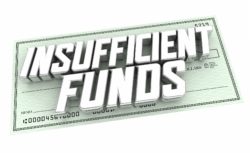Top Class Actions’s website and social media posts use affiliate links. If you make a purchase using such links, we may receive a commission, but it will not result in any additional charges to you. Please review our Affiliate Link Disclosure for more information.
The Bell Bank returned item fee is essentially the same as the non-sufficient funds fee (NSF) charged by most financial institutions. These fees are charged to a depositor’s account when there is not enough money to cover a transaction (these are also known as returned item fees). While these fees are not illegal, plaintiffs in a number of recent lawsuits have claimed that banks and credit unions have abused the practice by charging the same fee multiple times on a single transaction.
Is the Bell Returned Item Fee the Same as an Overdraft Fee?
Not exactly. An NSF fee is charged when a check is not honored because of insufficient funds and the bank returns it to the merchant. An overdraft fee is assessed when the depositor has overdrawn his or her account, but the bank advances funds in order to cover the transaction.
For ATM transactions and one-time debit transactions, the depositor must affirmatively opt in to overdraft protection. Since 2010, banks and credit unions have been prohibited by law from assessing overdraft fees on these types of transactions without the customer’s opt-in.
This said, the amounts charged for NSF fees and overdraft protection are similar, ranging from $27 to $35 per item.
Are There Limits on NSF Fees?
Under federal law, banks and credit unions can charge as much as they like, however, many state laws put limits on such fees. It should be noted that financial institutions are required to disclose these fees when a customer opens an account. Often, states cap the fee at $20, $25, or $35, but Delaware and Mississippi each cap their NSF fees at $40 per fee. Some states instead cap fees at a maximum percentage of the bounced check amount.
I Just Made a Deposit, but my Check Bounced Anyway. Why is This?

Banks usually post deposits before debits, but are not under any legal obligation to do so. Furthermore, these institutions may have a cutoff time for deposits, meaning that if made after a certain hour, it won’t be posted until the following business day.
Why Was an NSF Fee Charged More Than Once for the Same Item?
A charge like the Bell returned item fee is typically assessed for every transaction that is passed through the account — so if a merchant attempts to deposit a check more than once, the result will be multiple fees for the same item. This practice has been a cause of action in lawsuits filed by plaintiffs claiming the practice is unfair and deceptive.
For example, the lead plaintiff in a class action against Bank of America claimed that she had been charged two NSF fees before the bank covered her transaction – then afterward, charged her another fee. Eventually, she said, the fees totaled more than the amount of the transaction and that the defendant had not made it clear that it would charge her multiple fees for a single transaction.
Banks sometimes also process transactions out of order, starting with the largest one instead of the oldest ones (“high to low” processing). This can cause a chain reaction, triggering numerous overdraft fees on relatively small checks, and has also been a common complaint among consumers. Indeed, overdraft fees rake in billions each year in overdraft fees: a whopping $34 billion in 2017 alone.
Can I File a Lawsuit Over Improper NSF Fees?
More and more consumers are turning to litigation against banks and credit unions that they allege engaged in deceptive or unfair practices, including charging unfair NSF fees. A number of major financial institutions have faced lawsuits over these kinds of unfair practices, including Bank of America, Capital One Bank, Digital Federal Credit Union, and Navy Federal Credit Union, among many others.
If you have been hit with improper NSF fees, such as more than one returned item fee on a single transaction, you may be able to file a lawsuit or join an existing class action lawsuit and pursue compensation. Filing a lawsuit can be a daunting prospect, so Top Class Actions has laid the groundwork for you by connecting you with an experienced attorney. Consulting an attorney can help you determine if you have a claim, navigate the complexities of litigation, and maximize your potential compensation.
Join a Free NSF Fee Class Action Lawsuit Investigation
You may qualify to join this NSF fee class action lawsuit investigation if you were unfairly charged NSF fees by one of these banks:
- Bancfirst
- Bell Bank
- Busey Bank
- Center Bank
- CenterState Bank
- Flagstar Bank
- Glacier Bank Wings Federal Credit Union
- Hudson Valley Credit Union
- Midwest One
- NBT Bank
ATTORNEY ADVERTISING
Top Class Actions is a Proud Member of the American Bar Association
LEGAL INFORMATION IS NOT LEGAL ADVICE
Top Class Actions Legal Statement
©2008 – 2024 Top Class Actions® LLC
Various Trademarks held by their respective owners
This website is not intended for viewing or usage by European Union citizens.
















2 thoughts onWhat Is a Bell Bank Returned Item Fee?
Add me
add me in